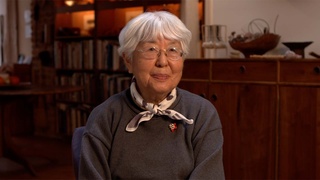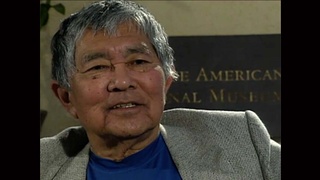Interviews
Undergraduate studies interrupted following Pearl Harbor
It was the most devastating feeling that I ever had. I was at the University of Oregon dorm and called at the dorm called Sherry Ross Dormitory. All my friends or, you know, classmates just didn’t know what to say to me. It was just dead silence. When I walked in downstairs, you see, and listened to the radio – of course that’s all we had, we didn’t have television in those days. It was a terrible experience but two of my friends, you know, or so…came up and hugged me and said, “Sam, we know that you’re not the enemy or anything like that.” And broke the silence.
So comes 1942, talking about the University of Oregon. I was one more active person saying that, you know, we didn’t want to…we wanted to finish our Spring term. Spring term. We were on a spring basis. Not semester. And went to the president and asked him to ask…that was General DeWitt that was in charge – to allow us to finish our Spring term. And that president…which I never…that’s why I don’t support the University of Oregon anymore. The president says, “No. That would be a very unpatriotic thing to do.” So that was really devastating. So we didn’t finish our Spring term.
Date: December 8, 2005
Location: Oregon, US
Interviewer: Akemi Kikumura Yano
Contributed by: Watase Media Arts Center, Japanese American National Museum.
Explore More Videos

The lack of discussion about family’s incarceration in Amache
Sansei judge for the Superior Court of Los Angeles County in California


Her brother’s reasons as a No-No Boy
(b. 1923) Japanese American poet, activist

Her grandfather was pressured to teach Japanese
Sansei judge on the Superior Court of Los Angeles County in California

Neighbor took care of her mother after grandfather was taken by FBI
Sansei judge on the Superior Court of Los Angeles County in California

Immediately after the bombing
(b. 1938) Japanese American. Hiroshima atomic bomb survivor

Other family members not as lucky
(b. 1938) Japanese American. Hiroshima atomic bomb survivor

His parents had little hope that he had survived the atomic bomb
(b. 1938) Japanese American. Hiroshima atomic bomb survivor

His views on nuclear weapons
(b. 1938) Japanese American. Hiroshima atomic bomb survivor

Loss When Leaving for Manzanar
Japanese American animator for Walt Disney and Hanna Barbera (1925-2007)

Forcibly deported to the U.S. from Peru
(b. 1936) Japanese Peruvian incarcerated in Crystal City

Stories of Grandfather at a concentration camp in Fusagasuga
(b.1974) Japanese Colombian who currently resides in the United States

Her grandfather in a concentration camp in Fusagasuga (Spanish)
(b.1974) Japanese Colombian who currently resides in the United States

Family welcomed at Crystal City
(b. 1936) Japanese Peruvian incarcerated in Crystal City

First meal at Crystal City
(b. 1936) Japanese Peruvian incarcerated in Crystal City
